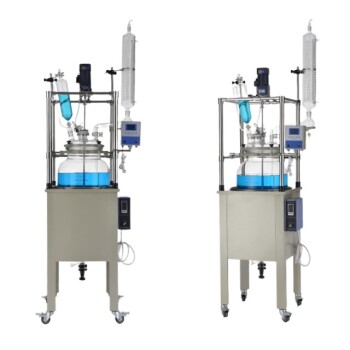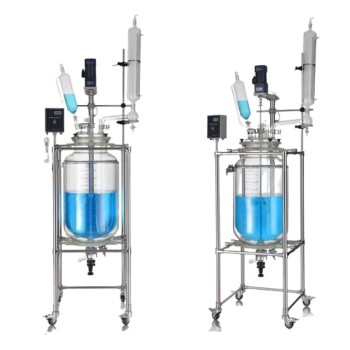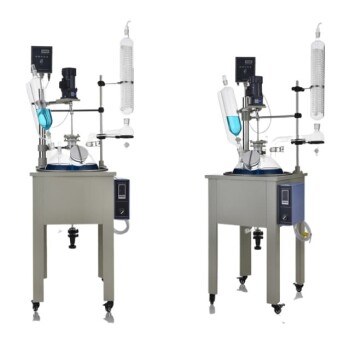A rotary evaporator is a highly versatile piece of laboratory equipment primarily used for the gentle and efficient removal of volatile solvents from samples. It is widely employed in industries such as biotechnology, pharmaceuticals, and chemical research, as well as in specialized applications like molecular cooking and cannabis extraction. Key uses include distillation, solvent recovery, concentration, drying, crystallization, and purification of compounds. Its ability to operate under reduced pressure and controlled temperatures makes it ideal for handling heat-sensitive materials, ensuring minimal degradation while maximizing efficiency. Rotary evaporators are essential for tasks like extracting essential oils, preparing samples for analysis, and recovering solvents for reuse.
Key Points Explained:

-
Distillation of Volatile Solvents:
- Rotary evaporators are primarily used for the distillation of volatile solvents under reduced pressure. This process is crucial in chemical and pharmaceutical industries for separating and purifying compounds.
- The reduced pressure lowers the boiling point of solvents, allowing for gentle evaporation without damaging heat-sensitive materials.
-
Solvent Recovery:
- Solvent recovery is a key application, especially in industries where solvents are expensive or environmentally hazardous. Rotary evaporators enable the efficient recovery and reuse of solvents, reducing costs and minimizing waste.
-
Concentration of Samples:
- By evaporating solvents, rotary evaporators concentrate samples, making them suitable for further analysis or processing. This is particularly useful in drug development, where small volumes of concentrated samples are required.
-
Drying and Crystallization:
- Rotary evaporators are used to dry products and facilitate crystallization processes. This is essential in the production of fine chemicals, pharmaceuticals, and other materials where precise control over moisture content is required.
-
Purification of Plant Extracts and Essential Oils:
- The equipment is widely used in the extraction and purification of plant extracts, essential oils, and other natural products. This application is common in the food, cosmetic, and pharmaceutical industries.
-
Molecular Cooking and Specialized Applications:
- Rotary evaporators are employed in molecular cooking to create extracts, distillates, and concentrated flavors. They are also used in cannabis applications, such as extracting CBD from marijuana.
-
Separation and Purification of Complex Mixtures:
- The ability to handle complex mixtures makes rotary evaporators indispensable in chemical and biological research. They are used to separate and purify solvents, inorganic salts, acids, and other compounds.
-
Preparation of Samples for Analysis:
- Rotary evaporators are used to prepare samples for further analysis, such as in drug development or chemical research. This involves concentrating or purifying samples to ensure accurate results.
-
Reflux Process Reactions:
- In some chemical reactions, rotary evaporators are used to facilitate reflux processes, ensuring continuous mixing and controlled evaporation of solvents.
-
Freeze-Drying Sample Preparation:
- Rotary evaporators are sometimes used in the preparation of samples for freeze-drying, a process that removes water from substances while preserving their structure and integrity.
-
Cannabis and Gin Applications:
- In the cannabis industry, rotary evaporators are used for extracting cannabinoids like CBD and THC. In the beverage industry, they are used for distilling and concentrating flavors, such as in gin production.
-
Versatility Across Industries:
- Rotary evaporators are versatile tools used in a wide range of industries, including biotechnology, pharmaceuticals, chemical research, food and beverage, and cosmetics. Their adaptability makes them indispensable for various processes requiring gentle and efficient solvent removal.
By combining reduced pressure, controlled temperature, and continuous rotation, rotary evaporators offer a precise and efficient solution for a variety of laboratory and industrial applications. Their versatility and reliability make them a cornerstone in modern scientific and industrial workflows.
Summary Table:
| Application | Key Benefit |
|---|---|
| Distillation of Volatile Solvents | Gentle evaporation under reduced pressure for heat-sensitive materials. |
| Solvent Recovery | Efficient recovery and reuse of solvents, reducing costs and waste. |
| Concentration of Samples | Prepares small, concentrated samples for analysis or processing. |
| Drying and Crystallization | Controls moisture content for fine chemicals and pharmaceuticals. |
| Purification of Plant Extracts | Extracts and purifies essential oils and natural products. |
| Molecular Cooking | Creates extracts, distillates, and concentrated flavors. |
| Cannabis Extraction | Extracts cannabinoids like CBD and THC. |
| Sample Preparation for Analysis | Concentrates or purifies samples for accurate results. |
| Reflux Process Reactions | Facilitates controlled evaporation during chemical reactions. |
| Freeze-Drying Preparation | Prepares samples for freeze-drying while preserving structure. |
| Gin Production | Distills and concentrates flavors for beverages. |
| Versatility Across Industries | Adaptable for biotechnology, pharmaceuticals, food, cosmetics, and more. |
Enhance your lab's efficiency with a rotary evaporator—contact us today to learn more!
















